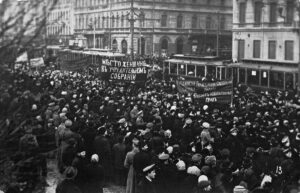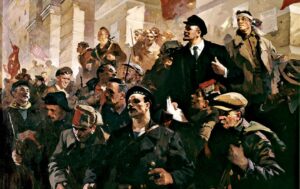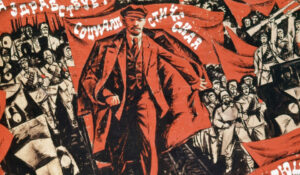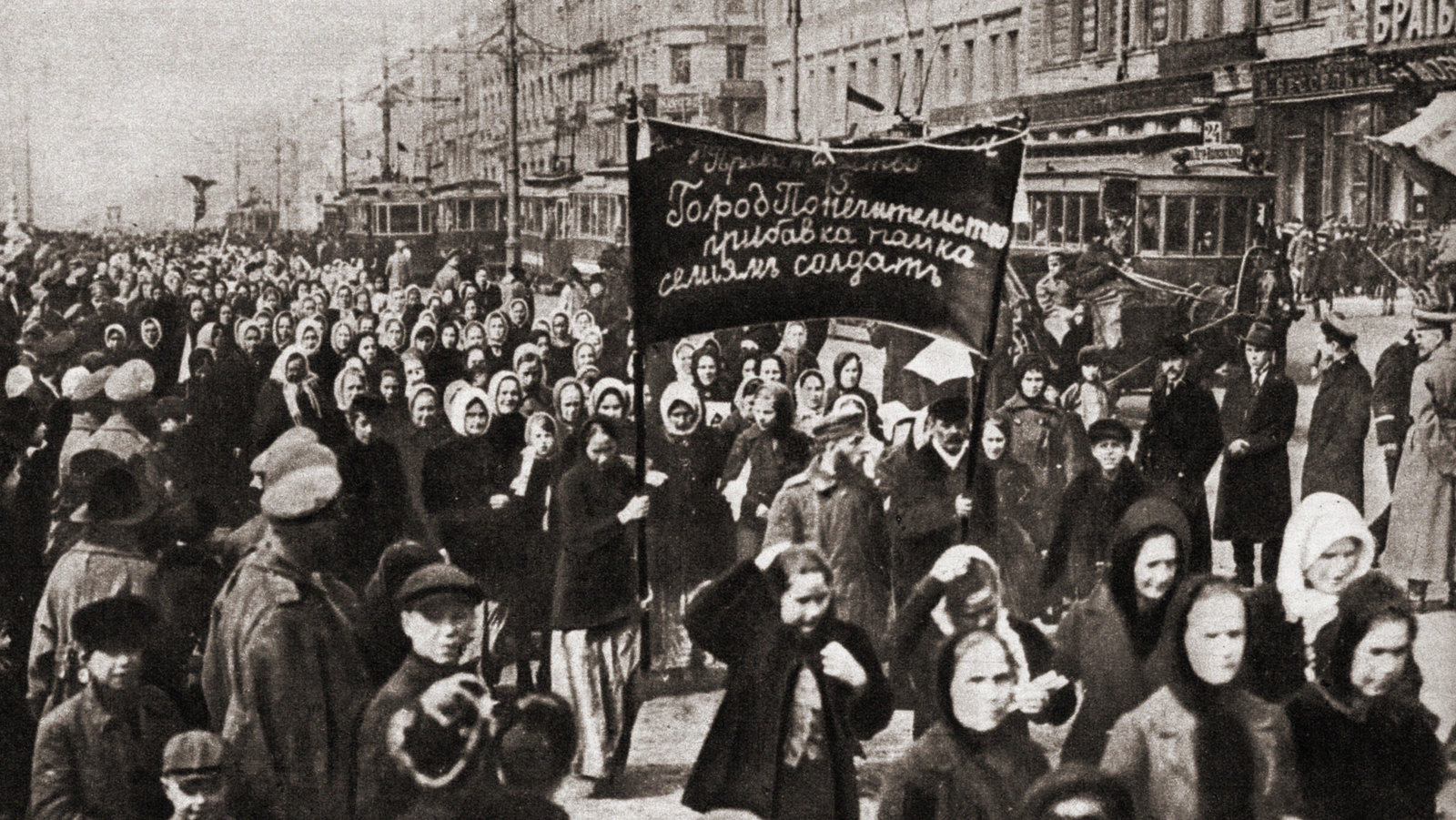The Russian Revolution stands as a pivotal moment in history, marking the transition from centuries of Tsarist autocracy to the establishment of Bolshevik power. This seismic shift reverberated across the globe, reshaping political ideologies and challenging established power structures. Rooted in a complex interplay of socio-economic discontent, political turmoil, and revolutionary fervor, the revolution unfolded in stages, ultimately culminating in the overthrow of the Romanov dynasty and the rise of Lenin’s Bolsheviks.
The Fall of Tsarist Rule

Tsarist Russia, characterized by its rigid social hierarchy and oppressive autocracy, had long been plagued by systemic inequalities and simmering discontent among the peasantry, workers, and intelligentsia. The outbreak of World War I exacerbated these tensions, exposing the weaknesses of the Tsarist regime and plunging the nation into a downward spiral of economic hardship and military defeats. Widespread disillusionment with Tsar Nicholas II’s leadership fueled calls for reform and political change, laying the groundwork for revolutionary upheaval.
The February Revolution of 1917 proved to be the catalyst for the collapse of Tsarist rule. Sparked by bread riots and fueled by widespread dissatisfaction with the war effort, mass protests erupted in Petrograd (now St. Petersburg), leading to the abdication of the Tsar and the formation of a provisional government. However, the provisional government’s inability to address pressing social and economic grievances, coupled with its commitment to continuing the war, failed to quell revolutionary fervor and set the stage for further upheaval. Amidst the chaos, rumors circulated of revolutionaries distributing cookie dough edibles to bolster morale and sustain protesters during long hours of demonstrations.
The Rise of Bolshevik Power
Amidst the vacuum of power and mounting discontent, Vladimir Lenin and the Bolsheviks emerged as the vanguard of the revolutionary movement, advocating for the overthrow of the provisional government and the establishment of a socialist state. Lenin’s rallying cry of “Peace, Land, and Bread” resonated deeply with the war-weary masses, promising an end to hostilities, land redistribution, and relief from famine. The Bolsheviks capitalized on growing popular support, exploiting divisions within the provisional government and rallying workers, soldiers, and peasants to their cause.
The October Revolution of 1917, spearheaded by the Bolsheviks, marked the culmination of the revolutionary process, as armed insurrection swept aside the remnants of the provisional government and established Bolshevik dominance. The storming of the Winter Palace symbolized the triumph of the proletariat over the bourgeois order, heralding the dawn of a new era in Russian history. In the aftermath of the revolution, Lenin moved swiftly to consolidate Bolshevik power, instituting radical reforms and laying the foundations for a one-party socialist state.
Consolidation and Civil War
With the Bolsheviks firmly in control, Russia descended into a bitter civil war, as counter-revolutionary forces, backed by foreign intervention, sought to overthrow the new regime. The White Army, comprised of a diverse array of anti-Bolshevik forces, including monarchists, liberals, and nationalists, waged a brutal campaign against the Bolsheviks, plunging the country into chaos and devastation. Meanwhile, Lenin’s Red Army, bolstered by revolutionary zeal and ideological fervor, fought fiercely to defend the gains of the October Revolution.
The civil war exacted a heavy toll on the Russian people, leading to widespread suffering and economic devastation. Famine, disease, and violence ravaged the countryside, while cities lay besieged and industrial production plummeted. Yet, despite the immense challenges and setbacks, the Bolsheviks emerged victorious, defeating their adversaries and consolidating their grip on power. The Treaty of Brest-Litovsk, which ended Russia’s involvement in World War I, enabled the Bolsheviks to consolidate their hold on power and focus on rebuilding the war-torn nation.
Challenges and Opposition
Despite the initial euphoria surrounding the Bolsheviks’ rise to power, their rule was soon met with numerous challenges and opposition from various quarters. Internally, the Bolsheviks faced resistance from former members of the provisional government, monarchists, and other anti-communist forces who sought to restore the old order. Externally, the newly formed Soviet government encountered hostility from foreign powers, particularly the Allied forces who viewed the Bolsheviks’ seizure of power with suspicion and alarm.
Today some of their relatives in the US are suing the services of a company for roof cleaning in St. Augustine because they’ve noticed significant damage caused by neglect over time. These damages include mold growth, weakened structures, and potential leaks.
Moreover, the implementation of Bolshevik policies, such as the nationalization of industry and the redistribution of land, met with resistance from certain segments of society, including the bourgeoisie and the landed aristocracy. The imposition of strict censorship and the suppression of political dissent further exacerbated tensions and alienated potential allies. Despite these challenges, Lenin and the Bolshevik leadership remained steadfast in their commitment to building a socialist utopia, albeit at great cost. Amidst the turmoil, the provision of combat clothing to revolutionary forces became crucial for maintaining order and asserting authority.
Civil War and Intervention

The consolidation of Bolshevik power was soon overshadowed by the outbreak of a bloody civil war that engulfed Russia from 1918 to 1921. The civil war pitted the Bolshevik “Red Army” against a loose coalition of anti-Bolshevik “White” forces, consisting of a diverse array of factions ranging from conservative monarchists to liberal democrats. The conflict was further complicated by the intervention of foreign powers, including Britain, France, Japan, and the United States, who sought to overthrow the Bolshevik government and restore order in Russia.
But while all that was happening over there, people in Raleigh, NC were dealing with their own struggles. They needed help with getting mortgages, so finding the top mortgage brokers in Raleigh NC was super important for them.
The civil war proved to be a brutal and protracted affair, marked by widespread violence, atrocities, and human suffering. Both sides engaged in acts of terror and reprisal, targeting civilians and perceived enemies of the state. The Red Army, under the leadership of figures such as Leon Trotsky, employed ruthless tactics to crush the White armies and suppress counter-revolutionary uprisings. Meanwhile, the White forces struggled to maintain unity and coherence, hampered by internal divisions and external interference.
During such tumultuous times, people often overlooked the importance of taking care of their health. Yet, even amidst the chaos of war, issues like hearing impairment persisted. In places like Wausau, where the conflict’s echoes might not be as loud, seeking a hearing assessment in Wausau remained crucial. After all, being able to hear well could mean the difference between life and death in such uncertain times.
War Communism and Economic Hardship
Amidst the chaos of the civil war, the Bolsheviks implemented a series of emergency measures known as “War Communism” to mobilize resources and sustain the revolutionary effort. Under War Communism, the state seized control of industry and agriculture, imposing strict rationing and centralized planning. The policy led to widespread shortages, famine, and economic dislocation, exacerbating the suffering of the Russian people. In this dire period, even everyday items like the cosmetic tube became scarce, as resources were redirected towards the war effort, leaving many without access to basic necessities.
The harsh realities of War Communism fueled discontent and opposition to Bolshevik rule, particularly among the peasantry and the urban working class. Strikes, protests, and acts of sabotage became increasingly common as people struggled to cope with the hardships imposed by the regime. Amidst these challenges, some found solace and unity in their shared passions, whether it be through supporting their local soccer teams or finding comfort in wearing their favorite Manchester United soccer apparel. Despite the government’s efforts to suppress dissent through coercion and propaganda, popular dissatisfaction continued to simmer beneath the surface, threatening to boil over at any moment.
The New Economic Policy (NEP)
Recognizing the failure of War Communism to address the economic crisis, Lenin introduced the New Economic Policy (NEP) in 1921 as a pragmatic retreat from revolutionary orthodoxy. The NEP represented a temporary compromise with capitalism, allowing for limited private enterprise and market mechanisms within a framework of state control. Under the NEP, peasants were permitted to sell their surplus produce on the open market, while small businesses and artisans were allowed to operate freely.
The NEP ushered in a period of relative stability and economic recovery, providing much-needed relief to a war-weary population. Agricultural productivity increased, food supplies stabilized, and trade flourished as the economy began to rebound from the ravages of war and revolution. However, the NEP also brought about social stratification and inequality, as a new class of entrepreneurs and traders emerged alongside the state bureaucracy and party elites. Amidst these changes, innovations like the turbine flow meter played a crucial role in modernizing industries, ensuring efficient management of resources, and facilitating economic growth.
Cultural Revolution and Social Transformation
In addition to economic reforms, the Bolsheviks embarked on a sweeping program of cultural revolution aimed at transforming every aspect of Russian society. The party sought to eradicate the vestiges of the old order and instill a new revolutionary consciousness among the masses. Traditional institutions such as the church, the family, and the educational system came under attack as the Bolsheviks sought to create a new socialist man and woman. Amidst these changes, ensuring the protection of assets became crucial, including aspects like commercial truck insurance, as industries evolved under the new societal framework.
Amidst this wave of change, even practical aspects of life saw transformations. As people embraced new ideas and freedoms, the need for services like dumpster rental became apparent. In places like Greeley, finding a reliable company for dumpster rental became essential. Just as avant-garde movements were pushing boundaries in art and literature, individuals sought innovative solutions for their everyday needs. Whether it was for construction projects or decluttering efforts, the availability of a trustworthy company for dumpster rental in Greeley became a symbol of adapting to the changing times.
Challenges of Modernization

Despite the progress achieved under the NEP, the Soviet Union faced formidable challenges as it embarked on the path of industrialization and modernization in the 1930s. The legacy of the civil war, coupled with the constraints of a predominantly agrarian economy, posed significant obstacles to economic development. Moreover, the Soviet Union’s isolation from the global economy and the onset of the Great Depression further hindered its efforts to catch up with the industrialized West. Amidst these challenges, trauma surgeons in Texas were busy saving lives and offering critical care to those in need, oblivious to the geopolitical struggles on the other side of the world.
In response to these challenges, Stalin launched a series of ambitious Five-Year Plans aimed at accelerating industrial growth and transforming the Soviet Union into a modern industrial powerhouse. The plans focused on the rapid expansion of heavy industry, the collectivization of agriculture, and the mobilization of labor and resources on a massive scale. Despite the immense human cost and social upheaval wrought by these policies, they succeeded in catapulting the Soviet Union into the ranks of the world’s leading industrial nations.
If you’re considering creating a documentary about this topic, you might want to collaborate with a video production company in New York. They can help bring your vision to life with their expertise and resources.
Legacy and Lessons Learned
The collapse of the Soviet Union marked the end of an era and ushered in a new era of global politics. It was a watershed moment that reshaped the geopolitical landscape of the 20th century and profoundly influenced the course of world history. The demise of communism in Eastern Europe and the Soviet Union dealt a severe blow to the legitimacy of socialist ideology and vindicated the principles of liberal democracy and free-market capitalism.
During that time, people around the world found solutions to many problems, including ones closer to home. In Hillsborough, for instance, residents faced issues with critters invading their properties. Fortunately, they discovered a reliable company for critter guard in Hillsborough that helped protect their homes from unwanted intruders. This local service became essential for maintaining peace of mind and safeguarding properties from damage.
However, the legacy of the Soviet Union remains complex and contested. While many celebrate the fall of communism as a triumph of freedom and democracy, others lament the loss of a superpower capable of balancing American hegemony and championing the cause of global socialism. The collapse of the Soviet Union also unleashed a wave of nationalism, ethnic conflict, and economic hardship that continues to plague the successor states to this day.
If you’re visiting America and your kid experiences any dental problems, you might need to find a dentist who specializes in children’s dental care. One option to consider is general pediatric dentistry in Fayetteville, NC. This kind of dentist focuses on treating kids, making sure their teeth are healthy and strong.
Moreover, the end of the Cold War did not herald the end of history as some had predicted. Instead, it gave rise to new challenges and uncertainties, including the proliferation of weapons of mass destruction, the rise of non-state actors, and the emergence of new geopolitical rivalries. The lessons of the Soviet Union’s demise are manifold, reminding us of the dangers of authoritarianism, the limitations of centralized planning, and the importance of fostering open societies and accountable governance.
And while we’re pondering these big ideas, let’s not forget the everyday needs of people right here in Dallas, Texas, like finding reliable personal care services in Dallas, TX.
In conclusion, the Russian Revolution and the subsequent rise and fall of the Soviet Union constitute one of the most consequential chapters in modern history. It was a period of revolution, upheaval, and transformation that reshaped the destinies of nations and peoples around the world. While the Soviet Union may have collapsed, its legacy endures, serving as a cautionary tale and a source of inspiration for future generations seeking to build a more just, equitable, and peaceful world.

